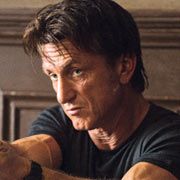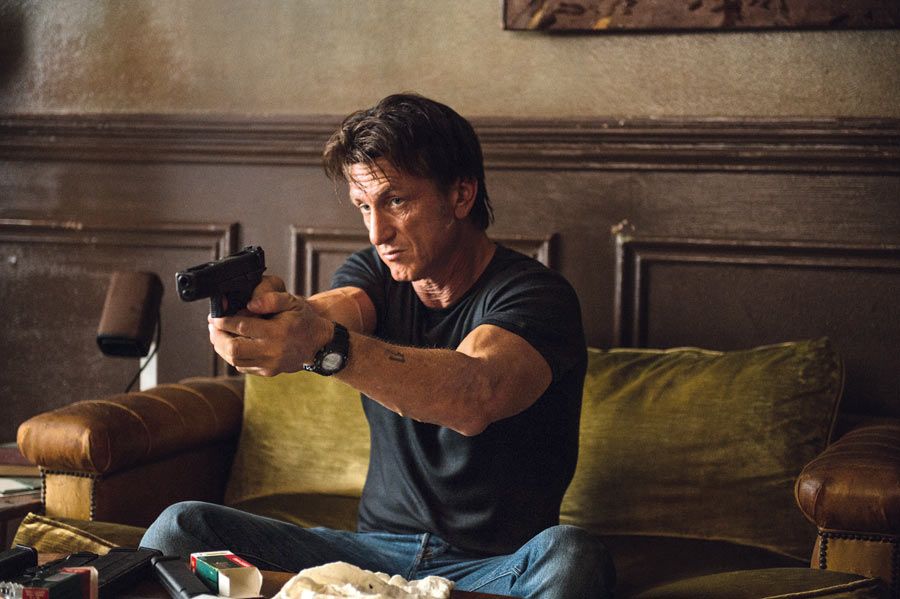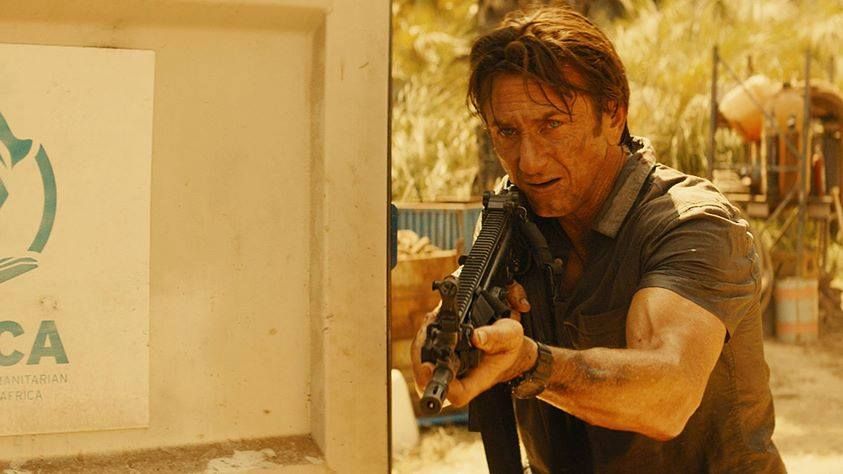After 35 years of appearing in finely-honed film roles, cultivating a reputation as an actor's actor, it's probably no surprise that when Sean Penn finally chose to take on his first-ever full-fledged, full throttle action movie, he bypassed the quips and winks that often populate the genre and went for one with a nod to social consciousness.
In "The Gunman," Penn plays American-born sniper Jim Terrier, tasked with Western meddling in Democratic Republic of Congo via the assassination of a government official while in the guise of a humanitarian aid worker. But after he succeeds and is forced to go underground to protect himself, he loses both his girlfriend and his taste for murder. Years later, he's a real-deal aid worker laboring in Africa until a surprise attempt on his life puts him on a trail for the reason that leads back to his shadowy, unsavory past and reunites him with his lost love -- and the man (Javier Bardem) who engineered the plot that first tore them apart.
Though directed by Pierre Morel -- the filmmaker who enlivened the aging actor action genre with "Taken," which reinvented Liam Neeson's image as a bone-crunching badass -- Penn says his still-muscular film follows a straighter, more dramatic and more complex path than more typical entries in the category.
"It's a movie about a very conflicted man killing very bad men, largely in service of himself, which is very different," Penn said, during a discussion with the press, including Spinoff Online. "This is why when the conversations [come up] about the Liam Neeson movies, where you have a six foot four melodically voiced masculine figure who is a very good man fighting strictly for his children -- I don't really see the comparison."
On whether he was specifically looking to take on an action-driven film at age 54:
Sean Penn: I'm more of a movie-by-movie, take-each-one-as-its-own-animal person. I was in Europe talking about this movie, these kind of questions come up a lot and I thought that there were a lot [of them]… I mean, I thought Harrison Ford had made a whole career out of a lot this stuff. I didn't think it was considered a new trend, things like that, what I call "geriaction."
But there are aspects of this that had nothing to do with that, also. Admittedly there's a tremendous amount of action -- one can't say it's not an action movie, but you know it's different kind of movie also, because it's not… many of these things are kind of wink-at-the-audience movies. This was more straight-line -- it wasn't like that. There were a lot of consequences to the violence and so on that appealed to me more. Though as an audience [member], some of the movies that rely on a lot of humorous quips or buddy action, there's a couple of those that I've enjoyed in a kind of guilty pleasure. This was a very different thing to me, and it just appealed to me on it's own terms.
On the combat style he employs in the film:
We talked early on and I was interested in the Krav Maga style of fighting. It's something I was interested in because I had seen it applied and knew, philosophically, it was different. There was no root in sport -- it was much more martial than art. And I thought it was, it is, the tactical advantages of that are what are being gone to in the world of those operators. So it was an accuracy issue.
On taking a part in writing the screenplay:
Pierre and I both kind of travelled some similar roads and interests and so on, so when he was busy choosing locations and actors and all that stuff, I was in rooms bringing some authenticity to some of the NGO [non-governmental organization] stuff and working with consultants on the military side. It was really that, because I'd spent a lot of time working on projects with, specifically, Special Forces -- former Special Forces and private contractors, and so one wanted to make sure that you can be as close as possible to the reality of it.
On layering in elements of humanitarian relief efforts into the film, something Penn has personal experience with in Haiti and other parts of the globe:
I think that Pierre and his production designer got all that stuff really right. We had conversations -- all three of us had some awareness of how that stuff worked… I think if it functions in any broader way, it's sort of on a subconscious level in the sense that if somebody younger, perhaps, is interested in this movie, they see this movie, maybe then, if there's a report on the Congo or on some similar situation -- exploited resources and people who are paying the price for it in their own countries -- maybe their ears perk up and they listen… I don't think, again, there's any aspiration to change the world with the picture, but I thought that it was a good real world reflection. Maybe some of the ways in which we approached some of that stuff and what influence I was able to have on that. But because we are now in the all-time, record breaking humanitarian crisis in terms of displaced people in the world and other issues and conflict, I have a feeling that this is going to be filtering in to a lot of peoples' filming systems and that more scripts that one reads will have aspects of these stories, because they're surrounding us and affecting us more and more directly all over the world.
So I think that probably there was the seed of it in there that interested me and I had some personal investment in, but I think is it's going to become a bit ubiquitous in coming years.
On his inability to predict whether his films -- or any film -- will be a hit with the movie-going public:
Reflectively, I can say that I have about a 35-year perfect history that has immunized me, which is that if I tried to guess what movie would be popular with an audience -- either a movie I saw or a movie I participated in -- I would be wrong every single time. It's not that I wouldn't invest in the culture of that concern, but I have no skill set for it. In fact, I would say I really, really, really don't like most of the films that become popular. I feel alienated from the world that embraces them. That doesn't help, in my sense of things. I really don't think about it, because I don't know how to.
I've never looked at a movie as beyond a movie. I wouldn't allow myself to think about that. I hope the best for this movie, we worked hard, a lot of people worked hard and invested in it.
On his plans to direct again:
I guess when I get on the railroad track in the tunnel, I'm going to run as hard as any time to stay ahead of that train. So whether I'm doing it and it's enjoyable, or I'm doing it and its not enjoyable… what's satisfying is when you're working with people who are working as hard as you are. I think if I could remember what it feels like when it's done, I would never do it again.
But it's a perishable awareness. What happens is that you finish, and if you're proud of the work you did and the relationships you came away with, the affections and respect for the people you work with and that's the common thing you shared, you think, "Oh, that might be nice thing to do again." And then you get there and say, "What did I do?" I don't know. Acting is… probably 20 years ago, after about ten years working in movies, it got to be a tricky thing for me. I guess what I would say is this: I can enjoy acting only if I'm working with a director I'm in sync with.
"The Gunman" opens today nationwide.



